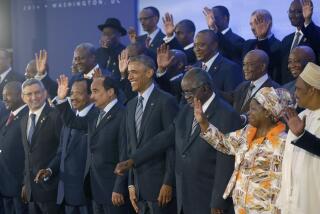U.S., Soviet Scholars on Africa
- Share via
A week before the Reagan-Gorbachev summit in Washington, a group of American and Soviet scholars met in Moscow to explore how a new spirit of cooperation could be applied in Africa. The challenge was to find ways of transforming the well-established pattern of hostile competition between the two countries in that area of the world into one of collaboration for the mutual benefit of both countries and Africa. The results of the Moscow workshop on Africa are highly promising.
Proposals offered by both sides call for initial attempts at cooperation that are modest and technical in nature. The participants developed joint statements in several areas of potential cooperation. Interestingly, in each of these statements it would be impossible to say to what extent a particular proposal represented a Soviet as opposed to an American position.
Our first topic was the general one of Soviet-U.S. cooperation for Africa as a confidence-building measure. The Soviet paper was presented by Anatoly A. Gromyko, director of the Institute for African Studies of the Soviet Academy of Sciences, and a corresponding member of the Soviet Academy of Sciences. We agreed that cooperation in Africa would be beneficial to the U.S. and Soviet Union in improving bilateral relations and in setting the stage for further cooperation in other regions and in other areas, for example in science and in space. We also agreed that Africa is a logical place for immediate Soviet-American action. Our countries may be able to help Africa given our resources, capabilities and anti-colonial history. Specific projects were considered in the area of food production, the environment, mineral development and communication.
Food production is a serious problem for Africa. We identified several interrelated sources of the crisis: ecological degradation leading to reduced land fertility, inadequate funding accentuated by the African debt burden and adverse terms of trade, lack of investment, insufficient research and development facilities, and urban and rural poverty.
The environmental crisis stems from several interrelated conditions found in the Sahel and other regions. Climate, population pressures, inappropriate agricultural techniques, overgrazing, and deforestation all play a role, but the most significant consideration is that desertification can be avoided. The technology, the knowledge, and the resources are all available to combat this and other environmental problems. An effective plan must include comprehensive studies of soil, water resources, climate, agriculture, etc. and joint projects to implement small-scale irrigation, resettlement where necessary of nomadic cattle breeders, and promotion of alternatives to firewood as cooking fuel.
Mineral resources and communications are other areas for potential cooperation. Paradoxically, several African economies with rich endowments of mineral resources have grown less rapidly than other African countries without such wealth due to factors that were analyzed in similar ways by the Soviet and American conferees. The U.S. and the Soviet Union both favor political stability and rapid economic development in the mineral export countries, and neither is heavily dependent on mineral imports from Africa. Their joint efforts could provide geological surveys using satellite reconnaissance and launch specific projects aimed at economic diversification and industrialization.
The delegates recognized that the ultimate goal is to build new structures of cooperation. Beyond these specific projects, we agreed that both sides should work together to help achieve a free and democratic South Africa and Namibia. Similarly, nuclear non-proliferation is a common objective for U.S.-Soviet efforts in Africa. The parties share the goals of gaining adherence to the non-proliferation treaty and the creation of a nuclear-free zone on the continent. Further, it was recognized that these objectives imply that costly and bloody military rivalry that have characterized superpower relations in southern Africa over the past dozen years must be ended.
While these and other specific items of potential accord are significant, perhaps even more hopeful was a tone of discussion that suggested a threshold of changed Soviet-American relations, assuming that opportunities to work together are seized.
GERALD J. BENDER
C.S. WHITAKER
USC
C.R.D. HALISI
Indiana University
MICHAEL D. INTRILIGATOR
MICHAEL F. LOFCHIE
WILLIAM C. POTTER
RICHARD L. SKLAR
UCLA
More to Read
Sign up for Essential California
The most important California stories and recommendations in your inbox every morning.
You may occasionally receive promotional content from the Los Angeles Times.













